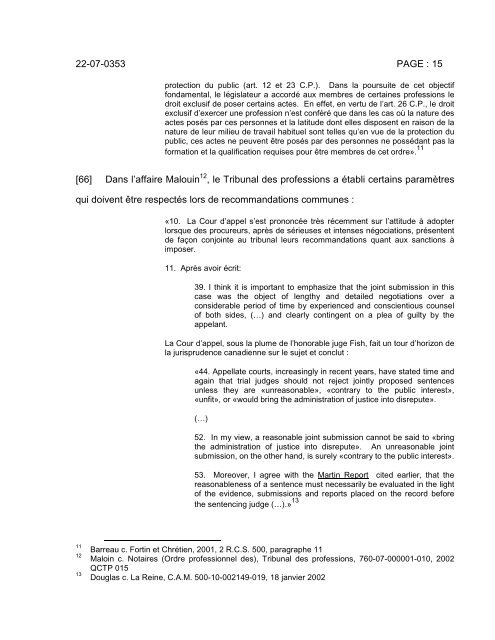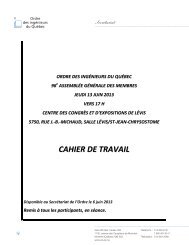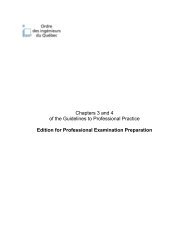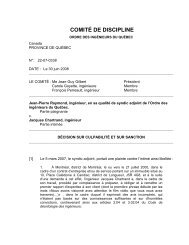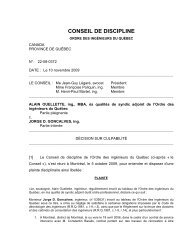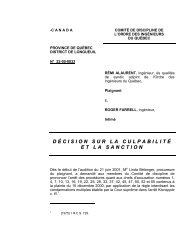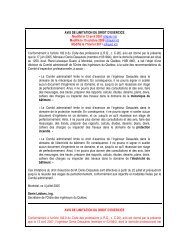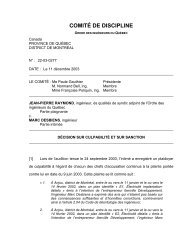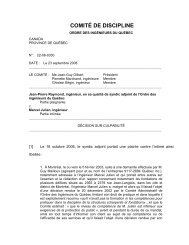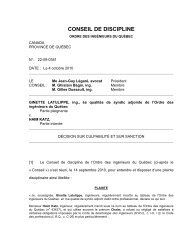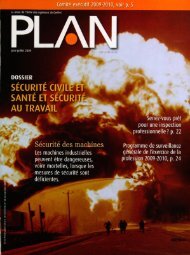22-07-0353 - Ordre des ingénieurs du Québec
22-07-0353 - Ordre des ingénieurs du Québec
22-07-0353 - Ordre des ingénieurs du Québec
You also want an ePaper? Increase the reach of your titles
YUMPU automatically turns print PDFs into web optimized ePapers that Google loves.
<strong>22</strong>-<strong>07</strong>-<strong>0353</strong> PAGE : 15<br />
protection <strong>du</strong> public (art. 12 et 23 C.P.). Dans la poursuite de cet objectif<br />
fondamental, le législateur a accordé aux membres de certaines professions le<br />
droit exclusif de poser certains actes. En effet, en vertu de l’art. 26 C.P., le droit<br />
exclusif d’exercer une profession n’est conféré que dans les cas où la nature <strong>des</strong><br />
actes posés par ces personnes et la latitude dont elles disposent en raison de la<br />
nature de leur milieu de travail habituel sont telles qu’en vue de la protection <strong>du</strong><br />
public, ces actes ne peuvent être posés par <strong>des</strong> personnes ne possédant pas la<br />
formation et la qualification requises pour être membres de cet ordre». 11<br />
[66] Dans l’affaire Malouin 12 , le Tribunal <strong>des</strong> professions a établi certains paramètres<br />
qui doivent être respectés lors de recommandations communes :<br />
«10. La Cour d’appel s’est prononcée très récemment sur l’attitude à adopter<br />
lorsque <strong>des</strong> procureurs, après de sérieuses et intenses négociations, présentent<br />
de façon conjointe au tribunal leurs recommandations quant aux sanctions à<br />
imposer.<br />
11. Après avoir écrit:<br />
39. I think it is important to emphasize that the joint submission in this<br />
case was the object of lengthy and detailed negotiations over a<br />
considerable period of time by experienced and conscientious counsel<br />
of both si<strong>des</strong>, (…) and clearly contingent on a plea of guilty by the<br />
appelant.<br />
La Cour d’appel, sous la plume de l’honorable juge Fish, fait un tour d’horizon de<br />
la jurisprudence canadienne sur le sujet et conclut :<br />
«44. Appellate courts, increasingly in recent years, have stated time and<br />
again that trial judges should not reject jointly proposed sentences<br />
unless they are «unreasonable», «contrary to the public interest»,<br />
«unfit», or «would bring the administration of justice into disrepute».<br />
(…)<br />
52. In my view, a reasonable joint submission cannot be said to «bring<br />
the administration of justice into disrepute». An unreasonable joint<br />
submission, on the other hand, is surely «contrary to the public interest».<br />
53. Moreover, I agree with the Martin Report cited earlier, that the<br />
reasonableness of a sentence must necessarily be evaluated in the light<br />
of the evidence, submissions and reports placed on the record before<br />
the sentencing judge (…).» 13<br />
11<br />
12<br />
13<br />
Barreau c. Fortin et Chrétien, 2001, 2 R.C.S. 500, paragraphe 11<br />
Maloin c. Notaires (<strong>Ordre</strong> professionnel <strong>des</strong>), Tribunal <strong>des</strong> professions, 760-<strong>07</strong>-000001-010, 2002<br />
QCTP 015<br />
Douglas c. La Reine, C.A.M. 500-10-002149-019, 18 janvier 2002


